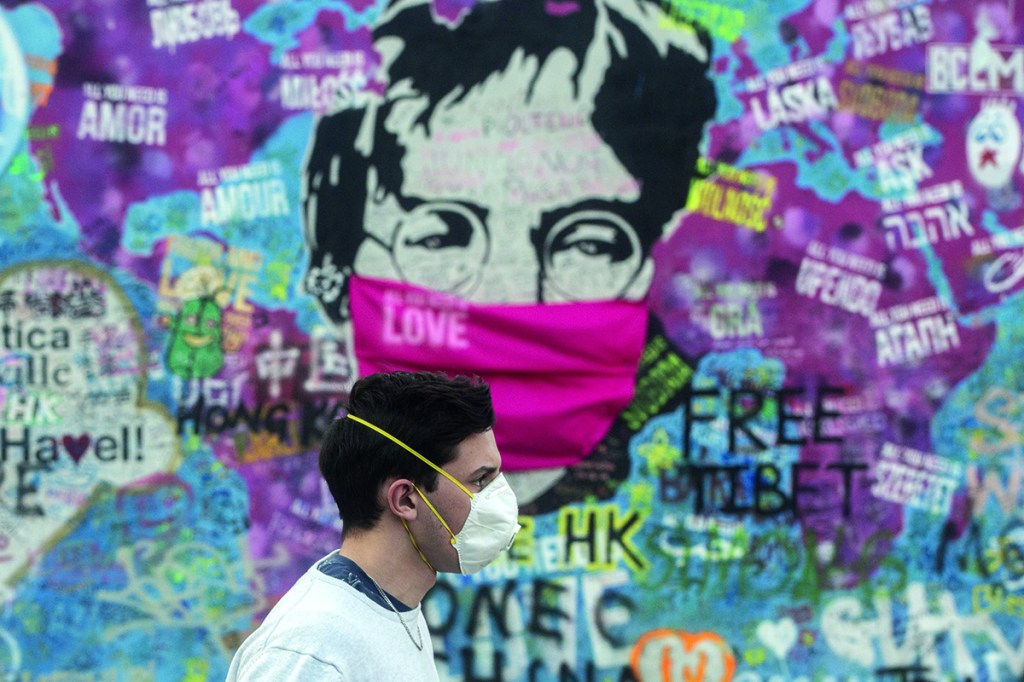An inescapable insight emerges from the lockdown: today’s young are not what the young once were. Scanning western streetscapes, it is hard to miss that the ones wearing face masks are not overwhelmingly — as one might expect — the old and vulnerable, but include a disquieting number of youngsters, all but immune to SARS-CoV-2, who wear their acquiescence in the current plunge into tyranny like a pendant of courage along with their Nike Airs and Buck Mason Mavericks.
It’s like rock ’n’ roll never happened. Or, rather, as if the rock ’n’ roll spirit had never proclaimed the rejection of slavery and subjugation. Once social distancing restrictions are canceled (if they are) these young people will flock again to hear Coldplay and U2, oblivious to something ineluctable in themselves: they are missing the point. Try as you might, you will not find a photograph anywhere of John Lennon wearing a face mask — although you can purchase a ‘John Lennon face mask’ with the slogan ‘War is over’ for $10. You can also get an Elvis mask offering ‘three layers of protection’, with a choice of legend: ‘Always on my mind’ or ‘TCB’. There’s even one of Johnny Cash giving the finger — why not get the point while missing it?
For more than a half-century, rock ’n’ roll was central to the formation and initiation of young westerners, influencing, inspiring, broadening horizons. Born of the congress between black music and white, this revolutionary form exploded in 1953 in Sam Phillips’s studio in Memphis, before going on to create, for the first time in history, a bespoke youth consciousness with its own soundtrack. From the opening notes of ‘That’s All Right’, Elvis urged the world to awake to freedom, desire, change, life, calling ‘Time!’ on post war torpor and weariness. His early songs were the manifesto of a new sensibility that declined the strictures of existing authority and the infallibility of adulthood.
The rock ’n’ roll spirit was neither primarily ideological nor big-P political, but an existential refusal, born of the surprise of the rock ’n’ roll encounter, which instantly inoculated against the acquiescent or banal. The rebellion was as much image as sensibility, attitude as conviction. It repudiated all forms of authority from parental to divine and asserted the vindication of human desire in its most immediate forms as the defining ethic of the age. The energy of those early moments later energized a decade, the Sixties — especially 1968 and its rejection of the political assumptions of the time. Sam Phillips later said that, until Elvis walked in the door, he hadn’t known what he was looking for. He just knew it would be something uniquely new, something that didn’t fit, didn’t make any sense of or reflect life in America as it then was: something that made everything a little bit irrelevant, created confusion, didn’t allow people to feel safe in ways they’d grown used to.
This existential shopping list hardly describes the rock ’n’ roll kids of 2020, who happily wear face diapers that are unnecessary, useless, spiritually destructive and actively harmful to the wearer’s health. Instead of an existential revolution or even the soundtrack for one, millennials have given us in cancel culture a phenomenon that has unleashed a trembling unknown since the days of Joe McCarthy, diverting their own idealism into trolling and snitching one another up for any shortfall in compliance with the diktats of PC.
Whereas the present generations appear at first sight engagé, their disposition is afflicted by a lassitude born of curiosity deficit. They seek to torch all history — including that of the music they have appropriated — on the altar of Woke. Superficially they appear the most ideological youth generation ever, but their convictions are imposed — by collective entrancement via technology and media — rather than organically grown in life experience. The result is a short-circuiting of existential energies into a narrow and virtually monolithic ideological outlook that has flipped the values of the erstwhile counterculture. As music fans they are but zombie consumers of image, sounds and attitudes, ogling the practitioner successors to Hank and Muddy who see common cause not with the downtrodden but the elites. Mostly, these days, this seems to rinse down to dinosaur NeverTrumping: Springsteen dissing the president elected by characters from his songs and Neil Young filing suit against the Trump re-election campaign for paying homage to his music at public rallies.
To a degree, the Atlantic has divided rock’n’ roll by sensibility, a split readily observable in comparing the Ramones with the Clash. The American ethos understood rock as a force for freeing souls and imaginations; the UK scene tended a little more toward social observation and action. Early on, the Beatles pursued a music capable of framing great profundities. Lennon had understood that rock ’n’ roll was capable of operating at the higher levels of reflection — provoking discussion as much as dance moves, but also catapulting the heart, gut and privates into a dance of understanding that left words standing by the wall. European rock, emerging in its full maturity with Kraftwerk, was more cerebral than its American progenitor, more preoccupied with ideas. Kraftwerk sought to build a sonic path to the present without going through the dark national past. European pop largely eschewed the Anglo-American rootedness in blues, sorrow, mud and sex, in search of an idiom focused on the subtexts of hyper-modern reality: atomization, alienation, the sleepwalks of reason and common sense. Rather than strings, wood and air, it gravitated to plastic, knobs and circuits, as though searching for the voice of a new kind of human, enmeshed in technology and observing his own osmotic mechanization. This probing was arrested in Manhattan on January 10, 2016, with the death of David Bowie, but its prophecies moved shortly towards fulfillment.
Rock ’n’ roll was only sporadically left wing. Born in the plantations of America’s deep South, its seed emerged from the hollering of brother to brother up along the chain-gang. Steeped in Mississippi mud, the blues merged with Negro spiritual singing and country, itself the offspring of Irish folk songs, far-traveled in the hearts of emigrants fleeing famine at home, to beget what emerged in Sam Phillips’s kitchen. The insinuation that music is a medium for social commentary is a misunderstanding arising from a couple of aberrations and misappropriation by rock journalism, an importunate, parasitical offshoot of the artform. Musicians seeking column inches went along for the ride; hence the studied virtue-signaling of such as Shakey and the Boss. Rock ’n’ roll it really ain’t.
The true greats never saw it like that. Take Dylan, still the conscience of the form — not by dint of stances but for remaining true to his own experience. In his 2004 published Chronicles, Volume One, he nominated the 1964 Republican US presidential candidate, Barry Goldwater, as his favorite politician, and debunked his own reputation as a symbol of resistance.
‘I had a wife and children whom I loved more than anything else in the world. I was trying to provide for them, keep out of trouble, but the big bugs in the press kept promoting me as the mouthpiece, spokesman, or even conscience of a generation. That was funny. All I’d ever done was sing songs that were dead straight and expressed powerful new realities. I had very little in common with and knew even less about a generation that I was supposed to be the voice of. I’d left my hometown only ten years earlier, wasn’t vociferating the opinions of anybody. My destiny lay down the road with whatever life invited, had nothing to do with representing any kind of civilization. Being true to myself, that was the thing. I was more a cowpuncher than a Pied Piper.’
Perhaps music is not revolutionary, but only appears so because it prefigures things rather than making them happen. If so, the stultification of Woke may be a warning that the variations have all been played and revolution is no longer conceivable. ‘Change,’ observed Jacques Attali, in Noise: The Political Economy of Music, ‘is inscribed in noise faster than it transforms society. Music is prophetic because…it explores, much faster than material reality can, the entire range of possibilities in a given code. It makes audible the new world that will gradually become visible.’
Perhaps the world changes itself and the music merely provides the backbeat. Political freedom amounts, simply, to the right to be left alone with life’s mysteriousness. What matters is the artist’s existence, gaze and repose, not his attitude, which is merely the grain of grit on which the pearl forms. The point is not to ‘say’ something but to make something that exists as a witness to life. A song, then, is neither placard nor pamphlet, but the fullest enrichment of the human breath. You cannot sing through a face mask, nor would there be a point.
There was a time when the rock ’n’ roll refusal represented a real threat, but that moment has lately past, with the atrophying of the music’s founding spirit. The young of 2020 lack both a necessity to overcome their immediate context and an attentive appetite for something greater than themselves — inevitabilities arising respectively from expanding prosperity and the death of God. Youth has been drained of all passion and empathy, so only ersatz emotions and responses survive. The rock ’n’ roll consciousness retains nothing but self-consciousness. Once a Trojan horse laden with magical understandings, the music has shriveled to mere repository of harmlessly harmonizing dangs and twangs, ambient noises for the lifestyles of generations who consume them like Kool-Aid. And the conditions that prevent the ‘youth of today’ from creating their own artforms and content render the young amenable also to acquiescence in establishment and corporate manipulation and recruitable as evangelists of tyrannical impositions.
Rock ’n’ roll was essentially an alternative way of hearing life’s promises. It delivered not thoughts but something beyond thinking, not messages of hope but hope itself. It was, above all, about remaining outside the herd, remaining totally oneself, above all about resisting tyranny — a music indubitably most unWoke.
This article was originally published in The Spectator’s January 2021 US edition.

























